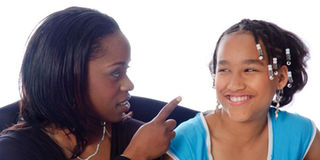The problem with helicopter parenting

Further, he attributes the tendency to be an overbearing parent to fear, a charge Rhoda concurs with. Says Rhoda: “There is always a fear that if you don’t hover over your kids, they may be up to some mischief or even run into danger." PHOTO | FILE
What you need to know:
- On one hand, according to Munyua, helicopter parenting such as Linda’s has been greatly fuelled by the modern, evolving world.
- The world has changed and you cannot just go out and discipline another person’s child.” According to Munyua, this in turn has caused children to be mischievous. To avoid this, many parents have been forced to use a heavy hand.
- Helicopter parenting could lead to depression, reduced satisfaction with life and lower levels of perceived autonomy, competence and ability to gel with other people.
Thirty-eight-year-old Linda Kanyamwe is an overbearing parent. Since her twin daughters turned four, Linda has not stopped hovering over them. Now aged 9, Linda admits that she wants to micromanage every aspect of their lives as she feels they shouldn’t engage in anything, other than school without her around.
“I know I might come across as domineering, but I can’t leave anything to chance,” she says.
Linda feels compelled to control and be present in every aspect of her daughters’ lives. Every day, she drops her kids off at school and leaves work early to pick them up. Once at home, Linda does not allow kids in their neighbourhood to visit.
“Immediately we get at home, they take a shower, complete their school assignments, and begin to watch cartoons, take a nap, play at the backyard alone, or study. They don’t venture outside the gate unless in my company,” she says.
When they are in school, Linda often calls to find out what they are doing or pops in unexpectedly to evaluate the kind of activities they are engaging in.
According to Ken Munyua, a psychologist based in Nairobi, Linda has taken on the helicopter parenting approach to raising her kids. Rhoda Atieno, a mother of one also uses this approach with her seven-year-old son.
KIDS IN A BUBBLE
“The world has become too competitive and I must make sure that my son is the best and brightest,” she says. To achieve this, Rhoda has taken to being on top of everything her son does at school and at home to the extent of crossing the thin line between care and concern, and being controlling and over-bearing.
On one hand, according to Munyua, helicopter parenting such as Linda’s has been greatly fuelled by the modern, evolving world. “A few years ago, a child belonged to the community. If you were an adult and met with a child erring, you did not hesitate to correct them” he says.
“Nowadays, the world has changed and you cannot just go out and discipline another person’s child.” According to Munyua, this in turn has caused children to be mischievous. To avoid this, many parents have been forced to use a heavy hand.
Further, he attributes the tendency to be an overbearing parent to fear, a charge Rhoda concurs with. Says Rhoda: “There is always a fear that if you don’t hover over your kids, they may be up to some mischief or even run into danger.”
However, these efforts to control kids and keep them in a bubble could be very well detrimental. According to Damaris Kamau, a child therapist based in Nairobi, helicopter parenting could lead to depression, reduced satisfaction with life and lower levels of perceived autonomy, competence and ability to gel with other people. “Oftentimes, a parent will fail to adjust herself with her child’s developmental need for autonomy,” says Kamau.
Her sentiments are echoed by a research study conducted by the University of New Hampshire (UNH). According to this study, authoritarian, overbearing parents were found to be more likely to raise disrespectful, delinquent children who do not see them as legitimate authority figures than authoritative parents who listen to their children and gain their respect and trust. “Overbearing parenting produces children who are discontent, withdrawn and distrustful,” said the researchers in their report.
According to the UNH study, “Middle-of-the road authoritative parenting style is the most successful style. Such parents balance making demands on their kids with being receptive to their children’s needs, resulting in kids who are self-reliant and content, mainly because they have some form of autonomy,” says the research report.
NEW LEAF
According to Kamau, allowing your children some form of latitude is a critical part of separation that allows children to grow into self-reliant young adults.
“This will allow your child to learn to take control of his or her behaviour without your hovering around or breathing down his neck,” she says. However, Kamau adds that the first step will always begin by your recognising that you are an over-bearing parent.
“If you have been too overbearing, you will always find it difficult to adjust to a new mode of parenting. Beginning by honestly exploring what makes you feel the need to overly-control your child will be a good step towards better parenting.”
Munyua adds, “Don’t push yourself to the point of being your ‘child’. Instead, teach her how to cope by turning day-to-day experiences into life lessons. In the same vein, remember to communicate fears that may lead you to be over-bearing in a language he or she will easily comprehend.”




